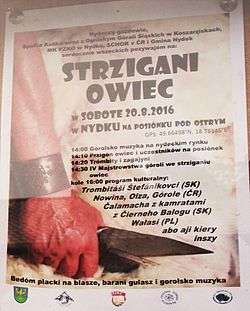Cieszyn Silesian dialect

Cieszyn Silesian dialect (Polish: gwara cieszyńska or dialekt cieszyński; Czech: těšínské nářečí, locals using this dialect say they speak "po naszymu") is one of the Silesian dialects. It has its roots mainly in Polish and also has strong influences from Czech and German and, to a lesser extent, from Vlach and Slovak. It is spoken in Cieszyn Silesia, a region on both sides of the Polish-Czech border. It lacks some official codification and remains a spoken language. The dialect is better preserved today than dialects of many other West Slavic regions.[1]
Polish and Czech linguists differ in their views on the classification of the dialect. Most Czech linguists classify it as a "mixed Czech-Polish dialect" (nářečí polsko-českého smíšeného pruhu).[2] Polish linguists tend to classify it under the Silesian dialects of Polish language.[3] Although the dialect has its roots mainly in Polish (phonology and morphology are consistently shared with Polish),[4] the diachronic development of the dialect is of a transitional nature.[1]
On the Czech side of the border (in Zaolzie) it is spoken mainly by the Polish minority.[5] It is used in Zaolzie to reinforce a feeling of regional solidarity. Before World War II the dialect, like all Silesian dialects, was strongly influenced mainly by the German language, as a significant proportion of the urban population were Germans. In 1920 Cieszyn Silesia was divided between Poland and Czechoslovakia. After that division the dialect in the Czech part of the region was and still is strongly influenced mainly by the Czech language (mainly lexicon and syntax),[4] with most new vocabulary, aside from English loanwords, borrowed from Czech.[6] On the other hand, in the Polish part it was and still is influenced by the Polish language.[7]
Writers and poets who wrote in Cieszyn Silesian dialect include Adolf Fierla, Paweł Kubisz, Władysław Młynek, Józef Ondrusz, Karol Piegza and Adam Wawrosz.
Example text
The Lord's Prayer in the Cieszyn Silesian dialect, with Czech and Polish for comparison:
| Cieszyn Silesian | Polish | Czech |
|---|---|---|
|
|
|
See also
Footnotes
References
- Dejna, Karol (1993). Dialekty Polskie. Wrocław: Zakład Narodowy im. Ossolińskich. ISBN 83-04-04129-4.
- Hannan, Kevin (1996). Borders of Language and Identity in Teschen Silesia. New York: Peter Lang. ISBN 0-8204-3365-9.
- Zahradnik, Stanisław; Marek Ryczkowski (1992). Korzenie Zaolzia. Warszawa - Praga - Trzyniec: PAI-press. OCLC 177389723.
Further reading
- Basara, Jan (1975). Słownictwo polskich gwar Śląska na terenie Czechosłowacji. Wrocław: Polska Akademia Nauk and Zakład Narodowy im. Ossolińskich. OCLC 2531024.

